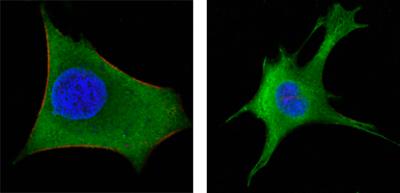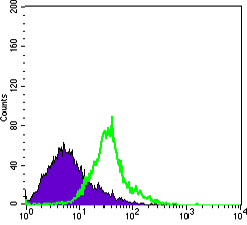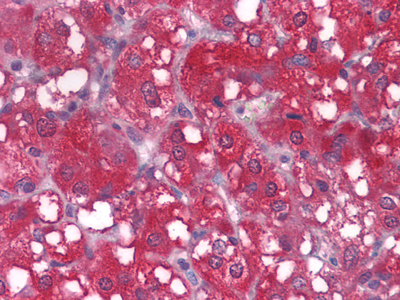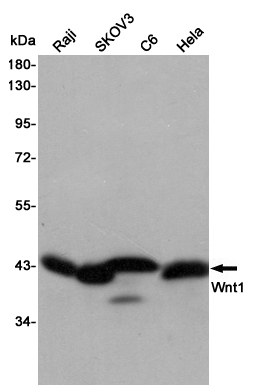-
Product Name
Anti-Wnt1 (6G6) Mouse antibody
- Documents
-
Description
Wnt1 (6G6) Mouse monoclonal antibody
-
Tested applications
WB, IHC-P, ICC/IF, FC
-
Species reactivity
Human, Mouse
-
Isotype
Mouse IgG1
-
Preparation
Antigen: Purified recombinant fragment of WNT1 expressed in E. Coli.
-
Clonality
Monoclonal
-
Formulation
Ascitic fluid containing 0.03% sodium azide.
-
Storage instructions
Store at 4°C short term. Store at -20°C long term. Avoid freeze / thaw cycle.
-
Applications
WB: 1/500 - 1/2000
IHC: 1/200 - 1/1000
ICC: 1/200 - 1/1000
FC: 1/200 - 1/400
ELISA: 1/10000
-
Validations

Confocal immunofluorescence analysis of Hela (left) and 3T3-L1 (right) cells using WNT1 mouse mAb (green). Red: Actin filaments have been labeled with DY-554 phalloidin. Blue: DRAQ5 fluorescent DNA dye.

Flow cytometric analysis of Hela cells using WNT1 mouse mAb (green) and negative control (purple).

Immunohistochemical analysis of paraffin-embedded human LAdrenal tissues using WNT1 mouse mAb

Western blot detection of Wnt1 in Raji,SKOV3,C6 and Hela cell lysates using Wnt1 mouse mAb (1:1000 diluted).Predicted band size:41KDa.Observed band size:41KDa.
-
Background
Swiss-Prot Acc.P04628.WNT1: wingless-type MMTV integration site family, member 1. The WNT gene family consists of structurally related genes which encode secreted signaling proteins. These proteins have been implicated in oncogenesis and in several developmental processes, including regulation of cell fate and patterning during embryogenesis. This gene is a member of the WNT gene family. It is very conserved in evolution, and the protein encoded by this gene is known to be 98% identical to the mouse Wnt1 protein at the amino acid level. The studies in mouse indicate that the Wnt1 protein functions in the induction of the mesencephalon and cerebellum. This gene was originally considered as a candidate gene for Joubert syndrome, an autosomal recessive disorder with cerebellar hypoplasia as a leading feature. However, further studies suggested that the gene mutations might not have a significant rolein Joubert syndrome. This gene is clustered with another family member, WNT10B, in the chromosome 12q13 region.
Related Products / Services
Please note: All products are "FOR RESEARCH USE ONLY AND ARE NOT INTENDED FOR DIAGNOSTIC OR THERAPEUTIC USE"
